Spirit of St. Louis: The places and faces that the Rams left behind

Last Saturday, St. Louis was a sports town. The United Soccer League’s St. Louis FC drew a sellout crowd, furthering the belief that this town may be next in line for an MLS expansion. Fans crowded the bars to watch Missouri hang with Georgia and then stayed to watch the town’s crown-jewel Cardinals top the Giants in the midst of an NL wild card hunt.
But then came Sunday. As the Rams debuted in Los Angeles, St. Louisans continued to adjust to their new NFL reality: a town without a team. SI spent this past weekend roaming the area, searching for answers to a question: What now, St. Louis? Here are some of the places and faces we visited along the way.
NFL Sunday in Los Angeles: Sights, sounds and tacos from the Coliseum
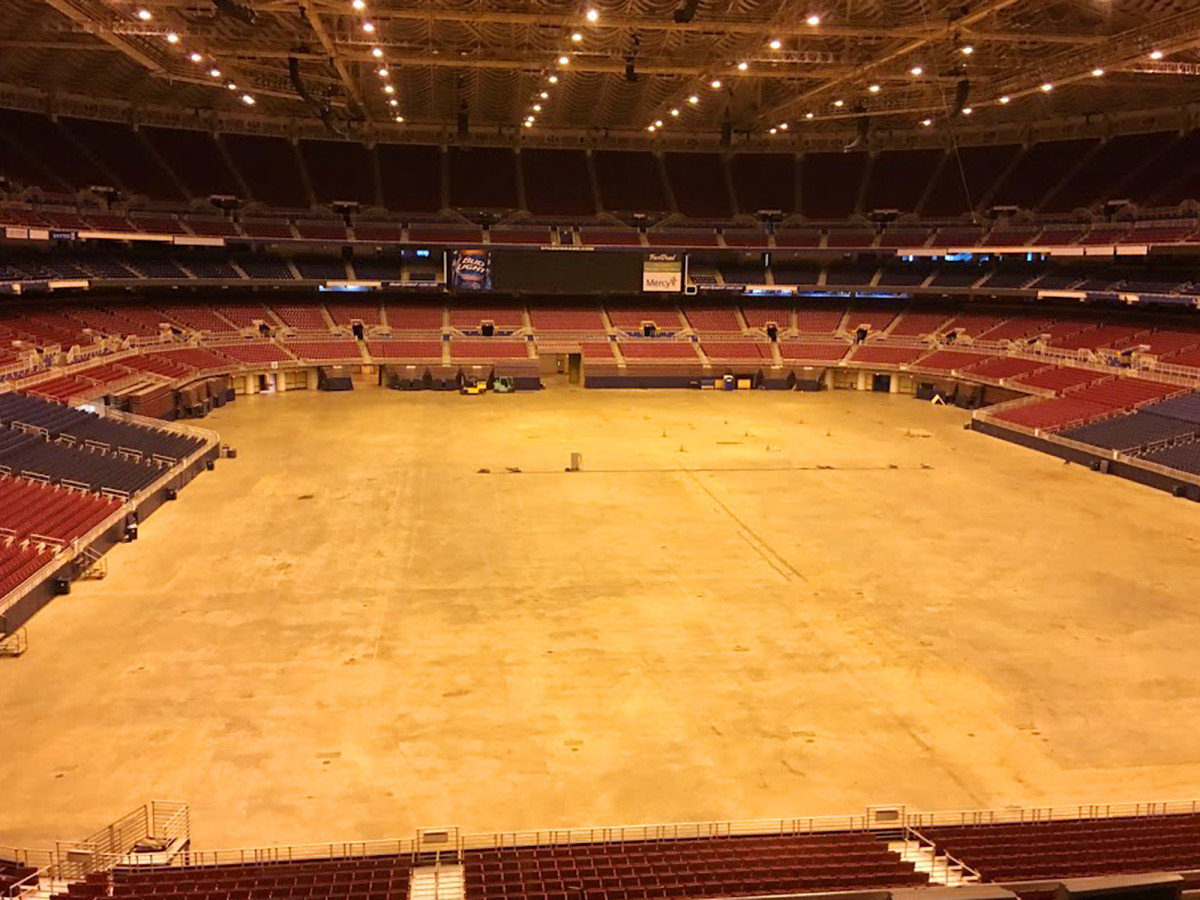
The Dome at America’s Center
On Rams gamedays, Kitty Ratcliffe had a unique tradition. The president of St. Louis’s Convention and Visitors Commission, which operated the team’s former home, would arrive early and climb to the upper level of what was then called the Edward Jones Dome (before the financial services outfit ended its sponsorship). From there she would watch as “a bunch of old men in blue jeans and T-shirts or jerseys” gathered outside, waiting for the venue’s gates to open. But last week she climbed to the same heights and was greeted by something else: “Girlfriend groups of 10, 12, 15—just dressed to the nines. They were out to have a ball.” Inside, Beyoncé awaited.
While the women prepared for a wild concert, Ratcliffe reminisced about what she called six years of “craziness,” starting when Stan Kroenke replaced the Frontierre family as majority owner of the Rams, in 2010. Back then Kroenke said, “I’m going to attempt to do everything I can to keep the Rams in St. Louis”—but Ratcliffe could already see the erosion of the relationship between her facility and the team that played in it. “When Stan took over,” she says, “it changed our lives.”
Eight months after Kroenke and company moved to L.A., Ratcliffe is still cleaning up the mess. As she walks around the facility, three men work to remove outdated advertisements, tied to the old team. Torn walls signify the former location of Rams heads. The scoreboard still touts STLOUISRAMS.COM.
From ugly hats to upsets, the biggest stories of Week 2
But while these signs of the past are ripped down around her, Ratcliffe looks to the future. Beyoncé's show is the dome’s first concert in over two years, and it's just the beginning of its post-NFL existence. In the coming months, the venue will host a monster truck rally and a dirt-track stock car race—events that wouldn’t have jibed with the turf laid down for the Rams this time of year. Newly free on Sundays, the dome will have an easier time hosting multi-day events along with the convention center next door. Down the street, bar manager Brian McAfee is banking on those gatherings to make up for the loss of gameday revenues. A full convention schedule, others hope, will make more palatable the $40 million City Hall still owes on the stadium.
Ratcliffe would like to see a few changes made, perhaps better connecting the Dome to the convention halls, but generally she’s defensive about a facility that was consistently maligned by a Rams ownership that was looking to leave. “They tried to make it about this facility not being up to their standards,” she says, “but they were the ones who put a lousy team out there.”
Fans around town echo that sentiment. No one complained about the digs before the Rams turned out 12 straight non-winning seasons, they say. And on Sunday, as the International Brotherhood of Electrical Workers’ convention takes place next door, there’s little kvetching about it. While the Rams kicked off in the Los Angeles Coliseum, 1,800 miles away, Hall 3 was packed for the final hour of the Electrical Industry Exposition. Afterward, visitors streamed onto Washington Avenue, where McAfee’s staff was waiting at the Over/Under Bar.
“The bars will all be happy with the IBEW people,” Ratcliffe says. “They were very happy with Beyoncé.”
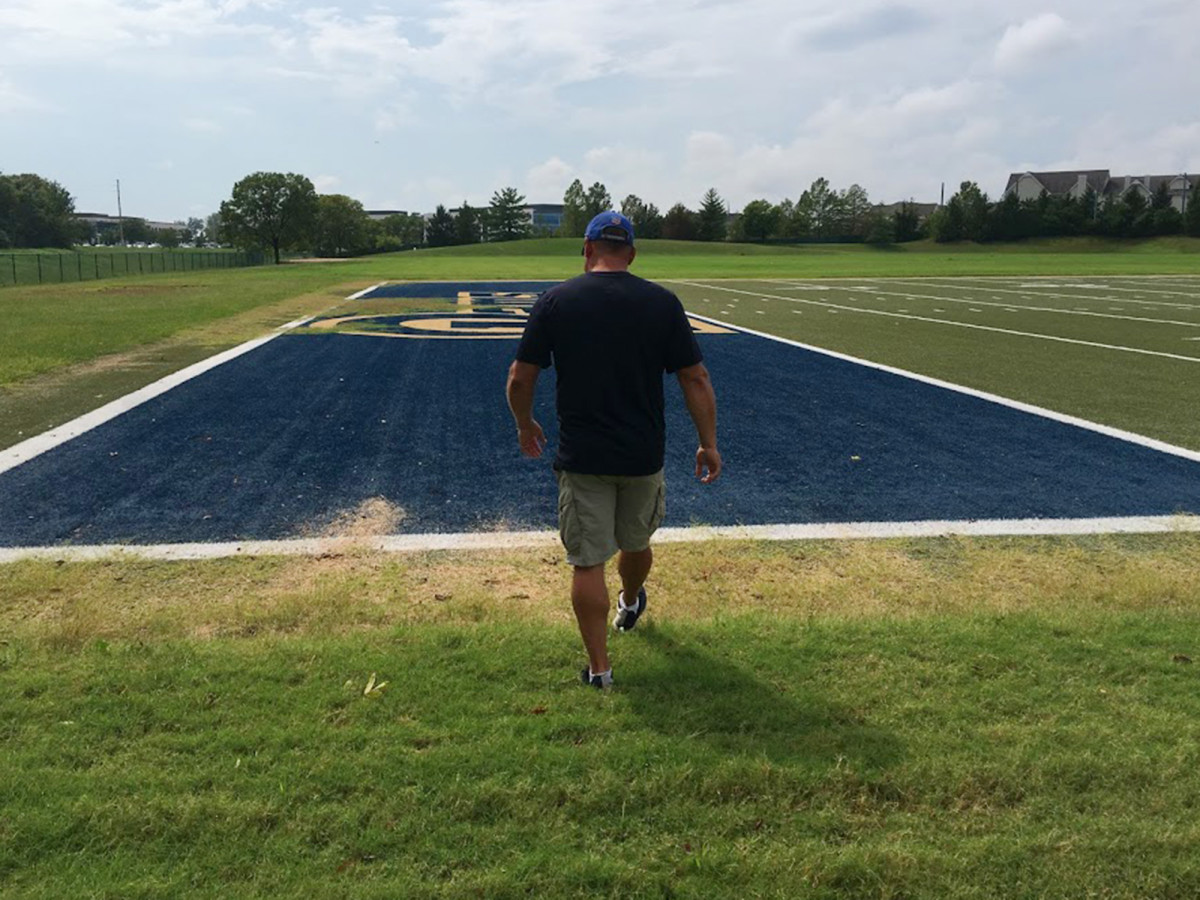
Rams Park
Grounds crews love Bermuda grass because when you treat it right it grows sideways, staying nice and low. From the time the Rams moved into their Earth City, Mo., practice facility, in 1996, to the week they departed, earlier this year, Matt Litzsinger cared to the Bermuda grass out back. Now the horizontal growth patterns are wreaking havoc on everything. Tentacles of real grass stretch through the turf field that sits adjacent to its natural counterpart. Elsewhere, large patches of sand and weeds dominate. “That’s where the 15- and 20-yard lines would be,” explains Litzsinger, touring the old grounds. “We’d always redo those parts every year.”
A couple of wild mushrooms have popped up too, not far from where Litzsinger long ago set up a putting green with a PVC flag in the center, 150 yards from the front of his office shed. Rams players and personnel would tee off, and if you hit the cup you made it into the Lid Crew. “Sam Bradford was obsessed with getting it in,” Litzinger recalls. But he never did. Kicker Greg Zuerlein, in fact, remains the only member of the Lid Crew, and unless someone has renovated, his name is still on the wall inside.
The Rams' 9–3 win vs. Seattle may tell us more about the Seahawks
One other feature of Bermuda grass: It goes dormant and turns brown each winter. The dreary expanse that greeted Litzsinger during his final weeks with the Rams only amplified the solemn events going on inside the facility. After the team’s move was officially approved, management went department by department, setting up meetings in which many employees were handed two options: a severance package or a relocation offer.
The team’s head of IT, Bill Consoli, who’d followed the Rams from L.A. to St. Louis in the first place, ultimately decided he couldn’t relocate again. “I’m 52,” he says. “I’m not that 31-year-old, ready for new challenges.” For weeks before his own meeting, assistant trainer James Lomax pondered the future with his wife, Sarah. Eventually, they decided on a number: If the Rams topped it they would follow the team to L.A.; if they didn’t top it, they’d stay. (Meanwhile, Lomax’s oldest daughter, eight-year-old Lucy, asked him one day on their way to school: “Daddy, do we have to go? I love my school and I have my friends here.” All he could say was, “I don’t know.”) Ultimately, right before the combine, Lomax was quoted a number that said Stay. For Litzsinger, he valued the connections he’d made at Rams Park, but they all paled in comparison to his responsibility to his wife, Connie, and their six-year-old daughter, Ellie.
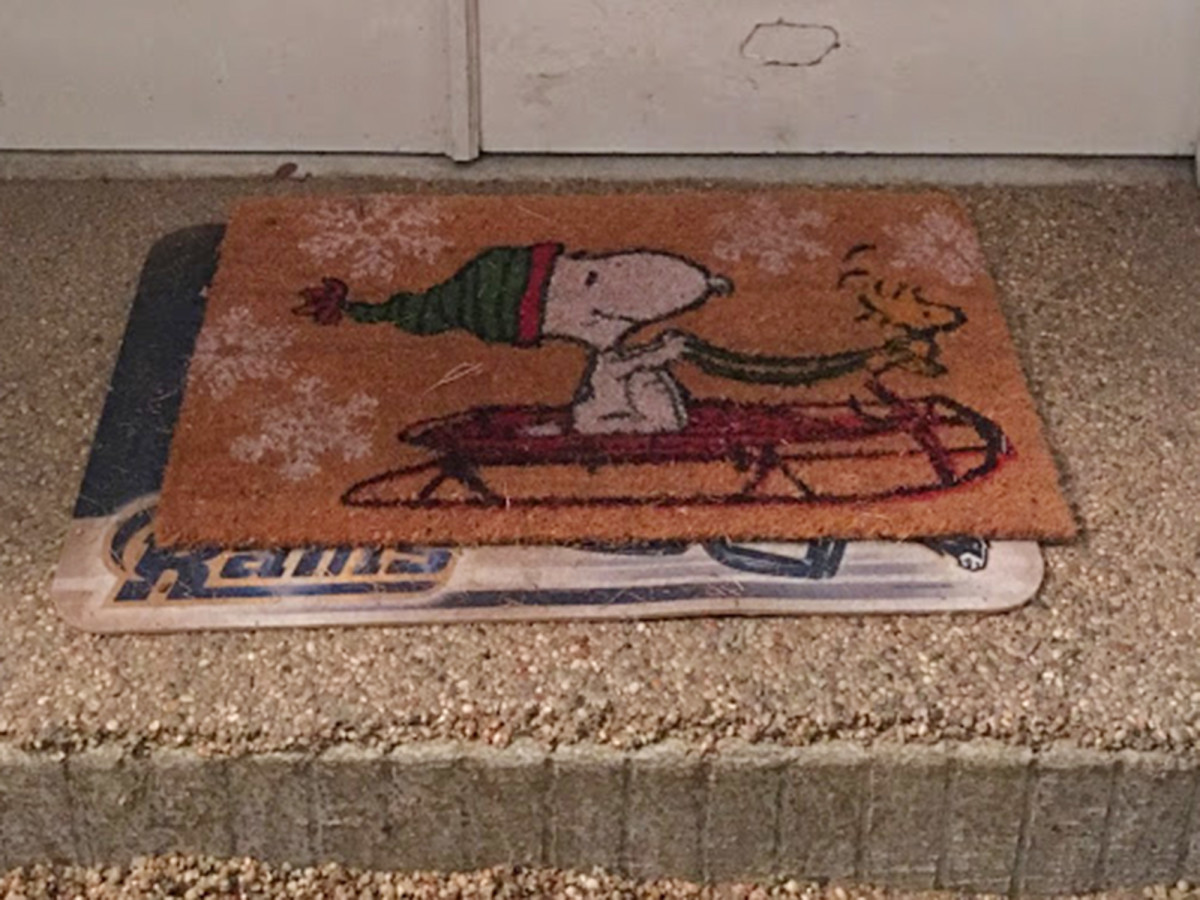
On Sunday, Lomax was out of town with family members, who are still adjusting to seeing him this time of year. Consoli, still in IT, was packing up his house, preparing to move in with his fiancée. Litzsinger, an entrepeneur at 51, is finally taking Ellie to school and picking her up regularly for the first time in his life. Connie always used to tell him, “You don’t get this time back,” and now he lives that way, too. He remembers nights spent crashing in a Rams player’s apartment, across the street from the facility (or worse: morning wake-ups from coaches who found him passed out in the players’ lounge). He enjoyed his time in the middle of that chaos, but he now knows he loved it “to a fault.” He still talks with his former colleagues; he even stays in touch with Bradford. But he doesn’t regret his decision to stay behind. In fact, in some ways he says the split was “lucky.”
He thought he’d miss the Rams when they left. Instead, he has come to realize just how much he missed while they were right here.
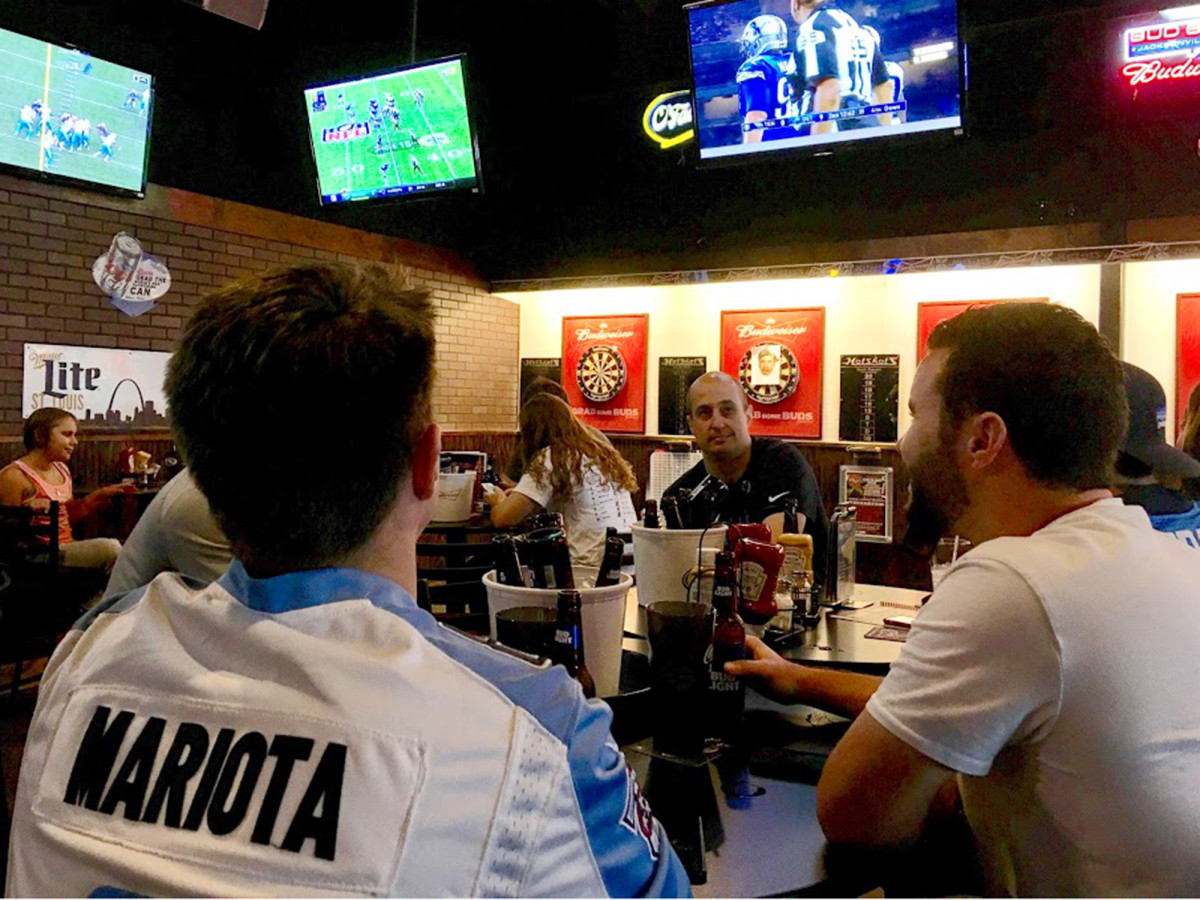
Various bars around town, including the home of St. Louis Titans fans
For Brad Beensen, this all started as a joke between friends. After the Rams announced their departure, Bernsen and his pals texted each other. The gist: I guess we have to pick a new team now. Quickly, though, it developed into an earnest discussion. No one could stomach rooting for any outfit from Chicago. Same for K.C. Bernsen didn’t want to hop on a powerhouse team.
Slowly, consensus formed around ... the Titans. Nissan Stadium was within a day’s drive and the team had several exciting young pieces—plus, Have you been to Nashville!? On a lark, Bernsen created a Twitter account, @StLouisTitans, that now has more than 600 followers (and an Archie Bell-inspired hashtag: #TitanUp). He finds himself overwhelmed by messages, many from Titans fans welcoming him, sending their condolences for losing the Rams. I couldn’t imagine what would happen if the Titans left, many write.
Bernsen’s adopted team has reached out too, offering behind-the-scenes access to him and nearly 40 other fans for a game next month. Meanwhile, the group watches every week at Hotshots. Everyone in the St. Louis Titans crew here knows someone who’s stopped watching the NFL altogether, but Mike Hamon speaks for the group when he says, “That was not an option. I just love betting, fantasy and drinking while watching games too much.”
Week Under Review: Welcome to the world of mediocre quarterbacks in the NFL
It’s a different story in the Hill neighborhood of St. Louis, a tight-knit old Italian community where alderman Joe Vollmer owns the local tavern, Milo’s, catty-corner from the church. Vollmer, 57, and his friends are done with pro football; they’ve canceled their Sunday Ticket packages, rerouted annual football pilgrimages to Baton Rouge instead of Green Bay and, during an American Legion cookout on Sunday, put NASCAR on the television instead of the Rams’ L.A. opener. This marks the third time Vollmer has seen the NFL disrespect St. Louis: first when the Cardinals moved in 1988 and again when the league passed over the potential St. Louis Stallions while expanding to Carolina and Jacksonville, in 1995. He’s had enough.
Meanwhile, Chelsea Osterby is still not sure what she’s going to do. “There’s just a big hole in my heart,” she says. She misses the emotional attachment of fandom but hasn’t found a new team. She’s from Wisconsin but “rooting for Green Bay is a little cliché.” For now, her handful of Rams jerseys—including the one she bought for her cat—gather dust on a shelf in her downtown loft.
Giant Steps of St. Louis
Betty Berger never fancied herself a big football fan, but she is taking the Rams’ departure as hard as anyone. The director of Giant Steps, a local school for children on the autism spectrum, struggles to quantify the team’s impact on her organization. The Rams took community work very seriously—when the team was in St. Louis, the Rams’ front office would shut down once a month (during both the season and the off-season) for a day of service somewhere in the community. The team had at least one and as many as four community events on every off day during the season, and 100% of the roster participated in at least one philanthropic event each year.
Now, Berger has seen fundraising hauls drop from $100,000 when the school held events at Rams Park to one-tenth that now. As a result, staff raises and bonuses are harder to come by this year.
But even that drop does not factor in the playground the Rams built five years ago and the murals they helped paint when the school moved to a new location. “The school had just a blacktop, and it was a pretty sad looking blacktop. We needed something safer,” Berger says. “When they were done it was a whole new building.” Rampage the Ram came by to play with the kids when it all officially opened, and team cheerleaders spiced up so many other events over the years.
Berger feels the absence of all of that now, especially given it comes on top of decreased contributions from Budweiser since being acquired in 2008 and the potential loss of Monsanto as a major partner after its recent merger with Bayer. “The Rams were very good to us,” she says.
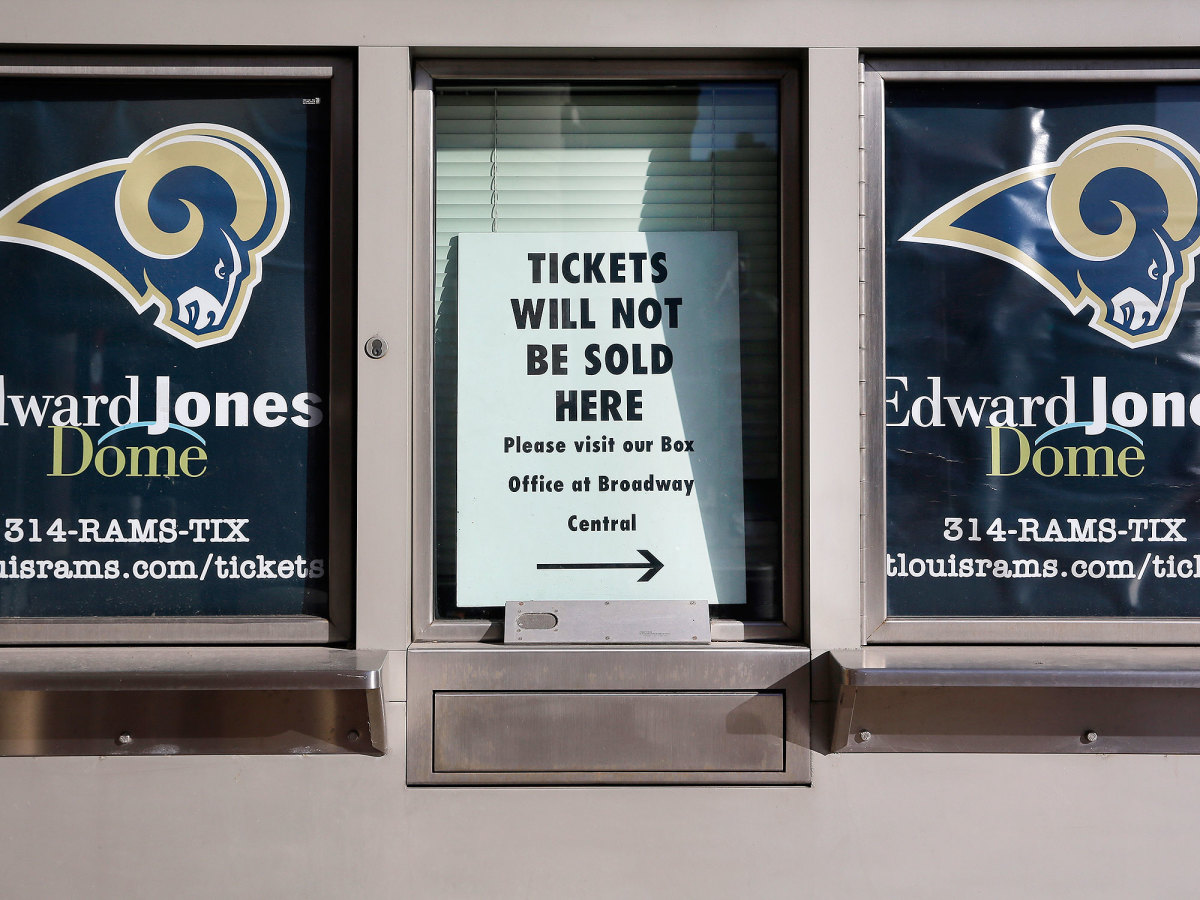
Andy McCollum
The former Rams center still watches the team, just like the other squads he played for during a 15-year career that included a Super Bowl championship in St. Louis. “You still root for the guys and the coaches, the people you played with and for,” he says, though the number of those players are dwindling with each passing year. As a St. Louis area resident, McCollum was disappointed by the move, obviously, but it did actually provide an opportunity to catch up with his former teammates from the glory years. He texted with fellow “Doughnut Brother” Adam Timmerman on the day the team’s departure was announced and saw several other guys for the first time in a while at the Legends of the Dome flag football game this summer, which served doubly as a fundraiser for the Isaac Bruce Foundation and a chance for fans to say a proper goodbye while honoring soon-to-be Hall of Famer Orlando Pace.
There may be more run-ins down the road as the Rams have invited McCollum and several other alumni to watch a game in L.A. The former center appreciated the gesture but added “I'm not in L.A. very often.” After all, there’s a reason he settled outside of St. Louis when he left the game. These days, he’s more worried about getting some of his six children to their soccer games on time and helping coach the local high school football team, which just lost its starting quarterback to injury. Oh, and if you are wondering: Yes, McCollum had Krispy Kreme for breakfast Sunday.
Wentz's early success is nothing short of remarkable, even vs. lowly Bears, Browns
Dave Peacock
For Peacock, the man who headed St. Louis’s stadium task force, losing the Rams obviously stings. But after a year-plus of hard work and public scrutiny to no avail, he's even more frustrated by the $17 million that went toward pitching a new St. Louis stadium to a league, that in retrospect, hardly seemed interested in the possibility.
“They asked us to take the design farther than we had planned,” Peacock says. “We did that. We delivered construction documents, effectively.” His advice for other cities going through the process in the future? “I would make sure to have, very clear up front in writing, exactly what they are going to be asked for and what’s expected. People will learn from our experience. When you spend $17 million over-delivering relative to what was asked by the league and come up with a $450 million plan and still get told no—You’ve got to be eyes wide open going in.”
“Not seeing any remuneration for the investment the public made in what I think was a very legitimate effort, that’s the only thing that leaves me with a bad taste,” he adds. “Those millions of dollars are very important and could have done a lot of good in St. Louis.”
• MMQB: Sam Bradford’s remarkable story | Jacoby Brissett steps into limelight
KTVI, ‘Home of the Rams’
Most estimates around town peg the percentage of St. Louis Rams fans sticking with the Los Angeles incarnation around 10-20%, with the rest either finding a new team or skipping the NFL entirely. So where does that leave the media members who made their bones talking football in St. Louis? For now, they are playing a lot of wait-and-see. KTVI, the former “Home of the Rams”, aired the game Sunday but said they will remain flexible moving forward in case fans run out of enthusiasm, curiosity, schadenfreude or some combination of the three.
After the team was blown out in the season opener against the 49ers (in a game that drew a solid rating in St. Louis), Bernie Miklasz took some time to laugh at “an abysmal brand of football” on his morning radio show. Following a bounce back win Sunday, he dedicated his first three of 25 league-wide observations to the game. Eventually, he plans to cover the Rams just like any other team, but seeing how emotional people still are over their departure, he knows now is not the time to do so.
“It became easy to kick St. Louis around as a city in turmoil and decline,” Miklasz says. “So I think there’s a sensitivity to how you are perceived, how the Rams left and the way they left, that really hurt people because we are sensitive to that perception that the city is dying and that it’s a complete mess. This only made all of that worse.”
St. Louis Post-Dispatch writerJim Thomas, meanwhile, was at the game in Los Angeles after watching Kansas City play San Diego during Week 1. Each Tuesday, he hosts an online chat that has turned into some combination of therapy session and turf war as fans in L.A. send football questions while St. Louis area readers sign in to vent their anger about the whole ordeal. As for Thomas, he misses covering practice on a daily basis and being embedded in an organization. That said, when he was given the chance to pursue a new gig in Southern California that would have afforded him that opportunity, he chose to stay put.
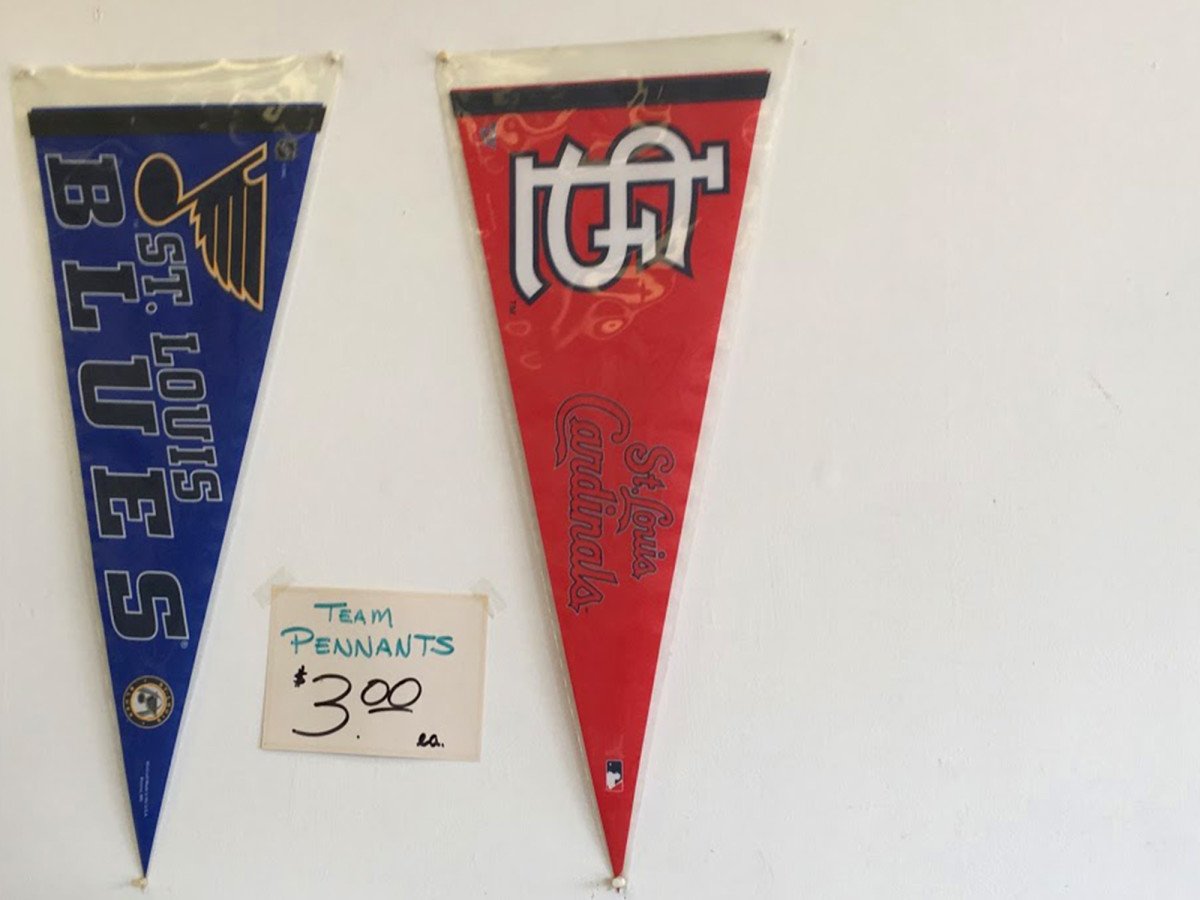
Sports Card Dugout
Having run a sports memorabilia shop for nearly three decades, Randy Fauth knows a thing or two about mementos. And he thinks fans are going to regret giving up theirs from the Rams’ glory years.
“All these people that want to get rid of Torry Holt jerseys, Marshall Faulk jerseys, Kurt Warner jerseys,” he said, “They are going to remember that the Rams were really good then and fun to watch. We got a Super Bowl in St. Louis. I still can’t believe they won. They never did that in Los Angeles.”
At the same time, Fauth understands the repulsion his neighbors feel when they look at all that Blue and Gold history. “I love footba— I used to love football,” he says. “I’m not playing fantasy any more. I'm not watching. How else will the NFL get the message? Maybe if enough people stop watching they’ll learn not to treat communities like pawns.”
